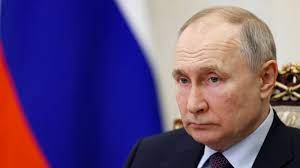Josep Borrell
On 17 July, nearly one year after the agreement was signed in Istanbul, Russia decided not to renew the Black Sea grain initiative (BSGI) that allows Ukraine to continue exporting agricultural goods to global markets during the war. As underlined by António Guterres, the secretary general of the UN, this initiative has been “a beacon of hope in a world that desperately needs it”.
Before Russia’s war of aggression, Ukraine was a critical global food supplier: a fifth of the world’s barley came from Ukraine, as well as a sixth of the maize and an eighth of wheat. After Russia invaded Ukraine in February last year, attacking grain fields and silos and blocking Ukrainian ports, global food prices spiked to record levels and endangered much-needed food supply for many importer countries. The BSGI aimed to re-establish a vital route for agricultural exports from Ukraine and to lower global food prices. Despite many challenges, it achieved its key purpose. Since August 2022, the export of almost 33m tonnes of grains and food from Ukraine to 45 countries played an instrumental role in reducing global food prices by 25% since the record high reached shortly after Russia’s attack. As public trade data shows, over half of the grain, including two-thirds of the wheat, went to developing countries.
In addition, the BSGI ensured continued access to grain for the World Food Programme (WFP). In 2023, Ukraine supplied 80% of the wheat procured to support humanitarian operations in the most food insecure countries such as Afghanistan, Djibouti, Ethiopia, Kenya, Somalia, Sudan and Yemen. Without the Black Sea route, the WFP has to get its grain elsewhere at higher prices and with a longer lead time at a moment when the world is facing an unprecedented food crisis. Russia’s decision was taken despite the UN secretary general’s renewed proposals to work to address the country’s concerns. In order to shift blame, Russia claims that its own agricultural exports were not sufficiently facilitated. This is not borne out by publicly available trade data, which shows that Russia’s agricultural exports are thriving. Russia gained important benefits from the memorandum of understanding with the UN on fertiliser exports, which had been brokered in parallel to the BSGI. The UN has worked relentlessly to clarify regulatory frameworks and engage with the private sector to find dedicated solutions across banking and insurance sectors. These efforts have been conducted in close collaboration with the EU and its partners. Contrary to the lies spread by Russia, the EU has indeed ensured that our sanctions have no impact on global food security. There are no sanctions on Russian export of food and fertiliser to third countries and the EU has provided extensive guidance to economic operators, clarifying that these transfers to third countries are permitted. We have also worked with the UN to allow related payments.
Despite these well-known and verifiable facts, Russia decided to pull out of the BSGI in July, using food as a weapon and endangering the global food supply. Hours after withdrawing, Russia started to destroy Ukraine’s grain storage facilities and port infrastructure with daily targeted attacks, not only in the Black Sea itself but also in the Danube. As an immediate reaction, wholesale wheat and maize prices saw their biggest increase since the start of Russia’s war of aggression. The increased food price volatility is likely to persist as long as Russia puts global food supply under deliberate stress, aggravating the global cost of living crisis – most acutely for food-insecure people in import-dependent countries. This is unacceptable and should be resolutely condemned. As the world deals with disrupted supplies and higher prices, Russia is now approaching vulnerable countries, notably in Africa, with bilateral offers of limited grain shipments, pretending to solve a problem it created itself. This is a cynical policy to deliberately use food as a weapon.
In response to Russia’s irresponsible actions, the EU is active along three main lines. First, we will continue to support the tireless efforts of the UN and Turkey to resume the BSGI. Second, we will continue to strengthen our “solidarity lanes” as alternative routes for Ukrainian agricultural exports to reach global markets through the EU. These lanes have allowed the export of more than 41m tonnes of Ukraine’s agricultural goods so far, and we are increasing this as much as possible to mitigate the consequences of Russia’s termination of the BSGI. Third, we have increased our financial support to countries and people most in need, providing €18bn (£15.5bn) to address food security until 2024. We call on the international community and all countries to step up their own assistance in support of global food security. We ask all our partners to urge Russia to return to negotiations as the African Union already has, as well as to refrain from targeting Ukraine’s agricultural infrastructure. With a clear and unified voice, we can get Russia to resume its participation in the BSGI. The world has a shared interest in responsible stewardship of global food security. We owe it to the people most in need.







